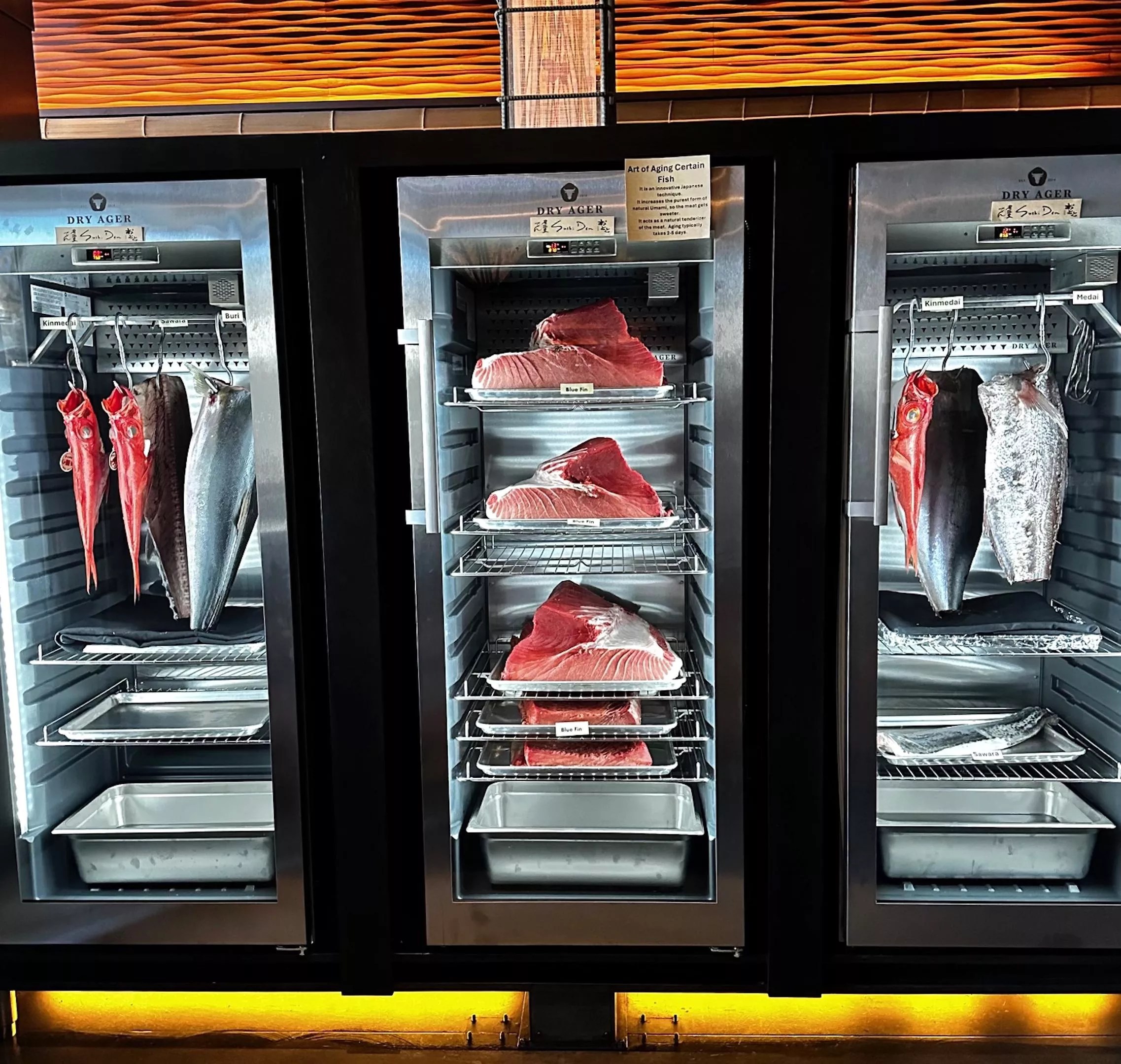
Courtesy of Sushi Den

Audio By Carbonatix
Two diners take their seats at the private sushi counter in the back of Sushi Den, at 1487 South Pearl Street. Co-owner Yasu Kizaki greets them and begins explaining how the restaurant sources seafood from a market in Japan, noting that much of what they’ll enjoy during their omakase experience is very, very fresh. “But some is very old,” he playfully adds.
Sushi Den was founded by Yasu and his brother, Toshi, in 1984. Forty years into its run, it remains one of the top dining destinations in the metro area, a reputation largely built on its seafood sourcing. It was one of the first sushi restaurants in the country to purchase directly from a fish market in Japan – for decades, the Kizaki’s youngest brother, Koichi, has made the early morning trek to the Nagahama Fish Market to select fish for the restaurant, which arrives in Denver within 24 hours.
Much of that fish is served immediately – but not all of it. During an omakase experience here, “You will have fish that came out of the ocean 25 hours ago, and some that is eight days old,” Yasu says.
“Fish like tuna, you cannot eat it right away,” he explains. That’s because it can take hours to reel in the large fish, and during that time, the tuna is “constantly fighting and trying to escape.” That causes the fish’s body temperature to rise and the meat to contract.
To stop the decomposition process, the fishermen flush out the blood with seawater, and the tuna is kept cold using ice water – but “the meat is so hard,” Yasu notes. So after it arrives at the restaurant, it’s dry-aged for up to seven days. The length of time depends on the size and type of the fish, and also how long it rested before being taken to market.
This is a technique that Sushi Den has always used, but now it’s on full display – Sushi Den recently set up dry-aging refrigerators in the entry of its sister restaurant next door, Izakaya Den. The Kizaki brothers also own Ototo just down the street, and this summer, Toshi will introduce a new omakase concept on the Sushi Den corner.

Dry-aged fish served at Sushi Den is kept at 1 degree Centigrade (33.8 degrees Fahrenheit).
Ellen Marchman
The whole and large cuts of tuna and other fish such as snapper are kept at 1 degree Centigrade (33.8 degrees Fahrenheit) in those refrigerators. During that time, “chemical reactions start to take place,” Yasu says. “Glutamate starts to be produced,” adding naturally occurring umami flavor and making the tuna sweeter. Dry-aging also makes the meat more tender.
“This process is very important,” Yasu notes before asking, “Would you like to meet my tuna?”
Instead of an actual fish, he pulls out a stuffed toy named Google that his staff bought for him after watching Yasu use other props to explain the different cuts of the fish to guests. “He’s a little shy,” Yasu jokes, before launching into the specifics about each part of the tuna.
As the meal continues, Yasu presents each course along with anecdotes about the preparation, and each bite builds upon the next. “Tell me when you’re about 75 percent full,” he says.
Just as he disputes the conception about fresh fish always being best, Yasu does not believe you should leave a meal 100 percent full. Instead, he wants each omakase guest to be fully satisfied but not uncomfortably stuffed.

Toro from Sushi Den.
Courtesy of Sushi Den
He also deviates from the typical omakase experience, which is usually dictated only by what the chef wants to serve, by asking each party at the chef’s counter to fill out a survey before arriving at Sushi Den, outlining preferences including any fish that are favorites as well as ones to avoid.
Even as more and more sushi restaurants open in the metro area, Sushi Den remains the gold standard in this city. And the chef’s counter omakase experience, which starts at $150 per person, is an ideal way to deepen your appreciation for this beloved staple – and to learn more about the art of sushi, including dry-aging.
Sushi Den is located at 1487 South Pearl Street and is open from 5 to 9:30 p.m. Monday through Thursday, 4:30 to 10 p.m. Friday and Saturday and 4 to 9 p.m. Sunday. For more information and to fill out a chef’s table reservation request form, visit sushden.net.